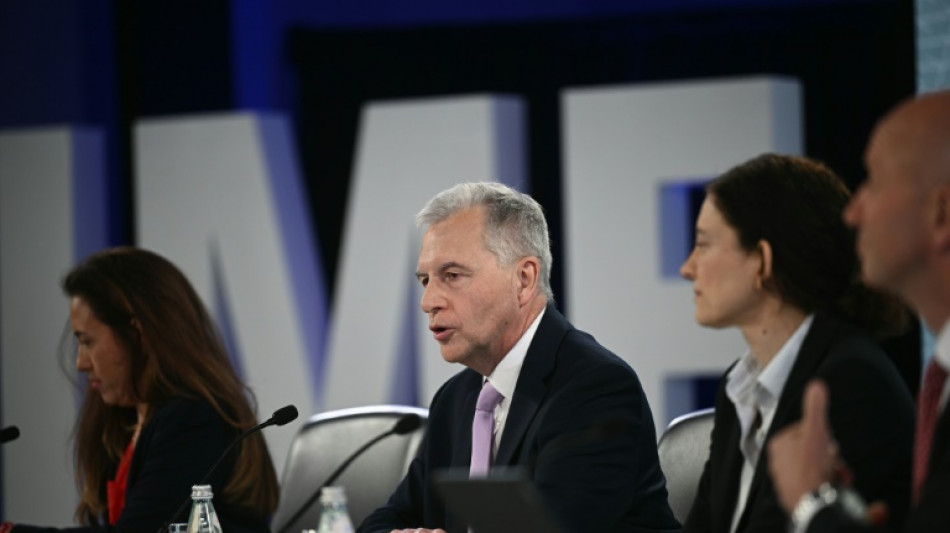
-
 Copa del Rey ref statements 'unacceptable': Real Madrid after boycotting final build-up
Copa del Rey ref statements 'unacceptable': Real Madrid after boycotting final build-up
-
Insurance CEO's accused killer pleads not guilty to federal murder charges

-
 FBI arrests Wisconsin judge for shielding undocumented migrant
FBI arrests Wisconsin judge for shielding undocumented migrant
-
Brazil ex-president Collor de Mello jailed for corruption

-
 Zelensky insists Crimea 'belongs' to Ukraine as US envoy meets Putin
Zelensky insists Crimea 'belongs' to Ukraine as US envoy meets Putin
-
Real Madrid boycott Copa del Rey build-up over referee complaints

-
 Trinidad and Tobago votes for parliament, PM, with opposition in lead
Trinidad and Tobago votes for parliament, PM, with opposition in lead
-
IMF chief hails 'constructive' Spring Meetings held under tariff uncertainty

-
 Iran FM Araghchi in Oman ahead of nuclear talks with US
Iran FM Araghchi in Oman ahead of nuclear talks with US
-
Dozens of buildings destroyed, 20 injured in Ecuador quake

-
 Young Barca must 'enjoy' Real Madrid Copa final fight: Flick
Young Barca must 'enjoy' Real Madrid Copa final fight: Flick
-
Pakistan and India border closure separates families

-
 Brazil's Bolsonaro 'stable' after post-surgery setback
Brazil's Bolsonaro 'stable' after post-surgery setback
-
Catholics in secular Cuba hail Francis as 'bridge'

-
 US envoy Witkoff, Putin discuss 'possibility' of direct Russia-Ukraine talks
US envoy Witkoff, Putin discuss 'possibility' of direct Russia-Ukraine talks
-
Community seeks answers after French school knife killing

-
 German prosecutors seek jail terms in VW 'dieselgate' trial
German prosecutors seek jail terms in VW 'dieselgate' trial
-
Sabalenka makes winning start at Madrid Open

-
 EU, US should de-escalate and negotiate trade deal: IMF Europe director
EU, US should de-escalate and negotiate trade deal: IMF Europe director
-
Russia accuses Ukraine of killing general in car bombing

-
 Emery wants FA Cup glory and Champions League berth for Villa
Emery wants FA Cup glory and Champions League berth for Villa
-
Buildings destroyed, one injured in Ecuador quake

-
 Foreign students give up American dream over Trump crackdown
Foreign students give up American dream over Trump crackdown
-
Syrian foreign minister raises new flag at UN headquarters

-
 Chelsea's troubled season not a failure insists Maresca
Chelsea's troubled season not a failure insists Maresca
-
Bruised Alex Marquez sets course to top Jerez practise times

-
 Lego block: Dutch court rules mould maker can't use toy trademark
Lego block: Dutch court rules mould maker can't use toy trademark
-
Pope Francis's funeral programme

-
 Sabalenka makes winning start in Madrid Open defence
Sabalenka makes winning start in Madrid Open defence
-
Postecoglou aims to ruin Liverpool title party despite boyhood fandom

-
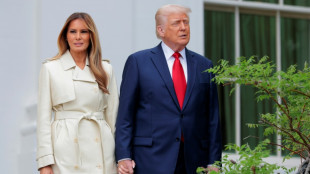 Pope Francis's funeral: who's attending?
Pope Francis's funeral: who's attending?
-
Wall Street stock rally falters as Trump touts 50% tariff victory
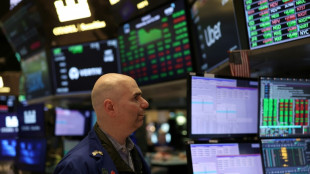
-
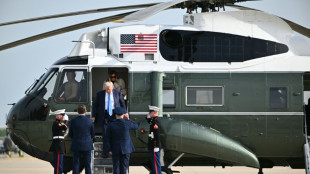 Trump heads to pope funeral in first foreign trip of new term
Trump heads to pope funeral in first foreign trip of new term
-
WFP says has depleted all Gaza food stocks as Israel blocks aid

-
 Man Utd's Dalot could miss rest of season: Amorim
Man Utd's Dalot could miss rest of season: Amorim
-
Trump claims China's Xi called him on tariffs
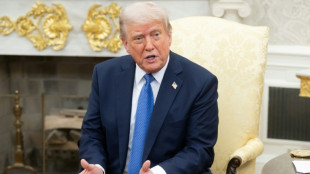
-
 Lyon request French league discard result of Saint-Etienne match
Lyon request French league discard result of Saint-Etienne match
-
Guardiola says Man City must show 'spirit' to get back on top

-
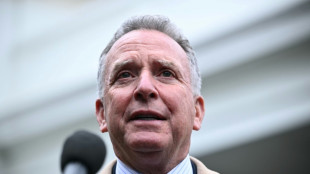 US envoy meets Putin in Russia for Ukraine ceasefire talks
US envoy meets Putin in Russia for Ukraine ceasefire talks
-
Hope, apprehension and politics: Cardinals search for new pope

-
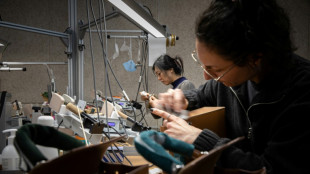 TikTok videos exploit trade war to sell fake luxury goods
TikTok videos exploit trade war to sell fake luxury goods
-
Russian general killed by car bomb near Moscow

-
 Clasico Copa final offers Mbappe, Real Madrid redemption
Clasico Copa final offers Mbappe, Real Madrid redemption
-
Sister Genevieve, French nun who broke protocol to see pope's body

-
 Actors with Down syndrome tear down barriers in London show
Actors with Down syndrome tear down barriers in London show
-
Nepal marks 10 years since devastating 2015 quake

-
 Stock markets rise on hopes of easing trade tensions
Stock markets rise on hopes of easing trade tensions
-
Russia holds key rate at two-decade high despite slowdown fears
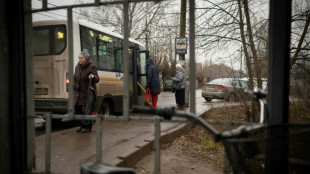
-
 Badosa pulls out of Madrid Open with injury
Badosa pulls out of Madrid Open with injury
-
Don't make 'disappointing' retreat on climate, COP30 CEO urges EU

| CMSC | -0.36% | 22.25 | $ | |
| BCC | -1.74% | 94.445 | $ | |
| SCS | -1.32% | 9.82 | $ | |
| RIO | -1.9% | 60.54 | $ | |
| NGG | -0.22% | 72.1 | $ | |
| GSK | -0.23% | 37.415 | $ | |
| AZN | 0.09% | 69.61 | $ | |
| BCE | -2.04% | 21.57 | $ | |
| RBGPF | -0.41% | 63.19 | $ | |
| JRI | 1.1% | 12.74 | $ | |
| BTI | -1.22% | 41.94 | $ | |
| BP | 0.15% | 29.045 | $ | |
| RYCEF | 3.05% | 10.15 | $ | |
| RELX | 0.46% | 53.415 | $ | |
| CMSD | -0.16% | 22.415 | $ | |
| VOD | 0.2% | 9.329 | $ |

EU, US should de-escalate and negotiate trade deal: IMF Europe director
The United States and European Union need to "de-escalate" and "negotiate a deal" to help boost lackluster growth on the continent, the International Monetary Fund's Europe director said Friday.
"In our discussions with European leaders, I don't sense any difference of views with regard to the importance of that relationship," IMF Europe Director Alfred Kammer told reporters in Washington.
"An effort needs to be made to de-escalate and to negotiate a deal," he said, adding he hoped the negotiations would be successful.
Kammer's comments came during a press briefing as part of the World Bank and IMF's Spring Meetings in Washington which has brought the world's finance ministers and central bankers together at the same time as many countries look to rapidly renegotiate their trading relationship with the United States.
Earlier this month, US President Donald Trump slapped steep tariffs on many countries -- including a new 20 percent rate on the European Union -- only to then temporarily roll back most tariffs to a "baseline" 10 percent rate a few days later.
Alongside these measures, the administration has also introduced sector-specific levies in areas including automobiles, steel and aluminum.
The White House has given those countries and blocs facing higher tariffs a 90-day period ending in July to negotiate a deal and bring down trade barriers with the United States.
It is the EU, and not member states, who have been tasked with negotiating the deal, but European finance ministers in Washington have still weighed in with their views of the state of negotiations.
"We're not going to hide the fact that we're still a long way from an agreement," French economy minister Eric Lombard said in an interview on Thursday.
At an IMF event later in the day, German Finance Minister Joerg Kukies struck a more hopeful note that a deal could be done in time.
"We're optimistic that it will work, the sooner, the better," he said.
Kammer also addressed the question of European growth, which has lagged behind the United States in recent years.
"There is a narrative out there that Europe is not competitive, and that narrative is actually wrong," he said.
"Europe is competitive. Europe has a current account surplus versus the rest of the world," he said. "What we are arguing is that Europe has a gap in its productivity and, in particular, a gap in labor productivity."
D.Schlegel--VB
